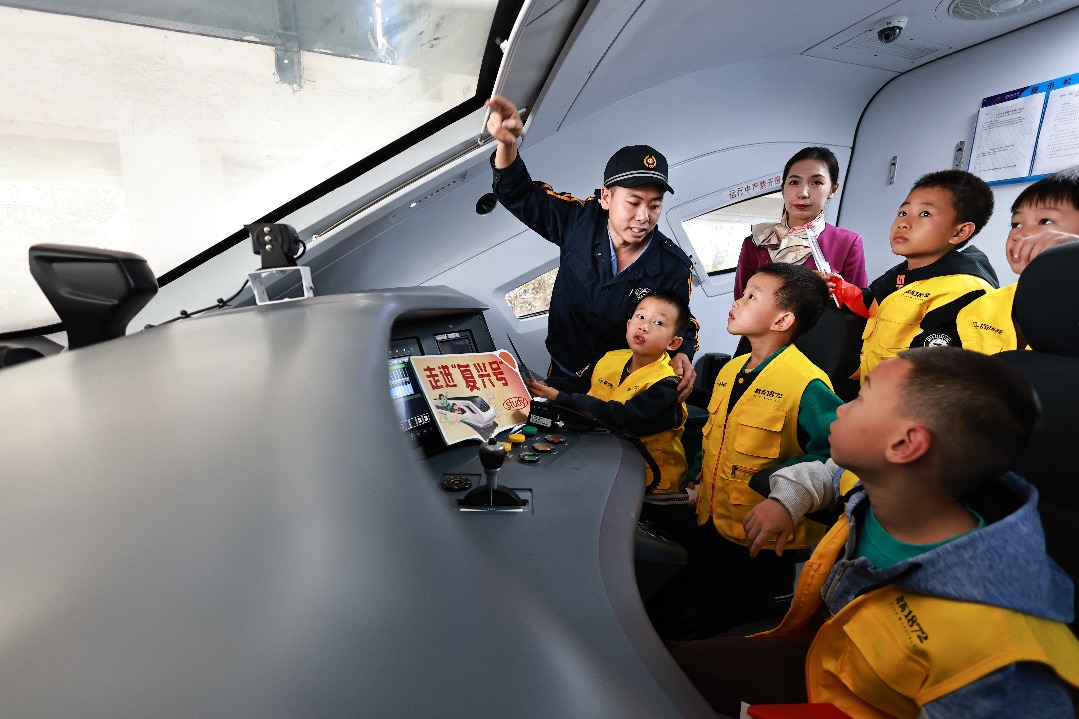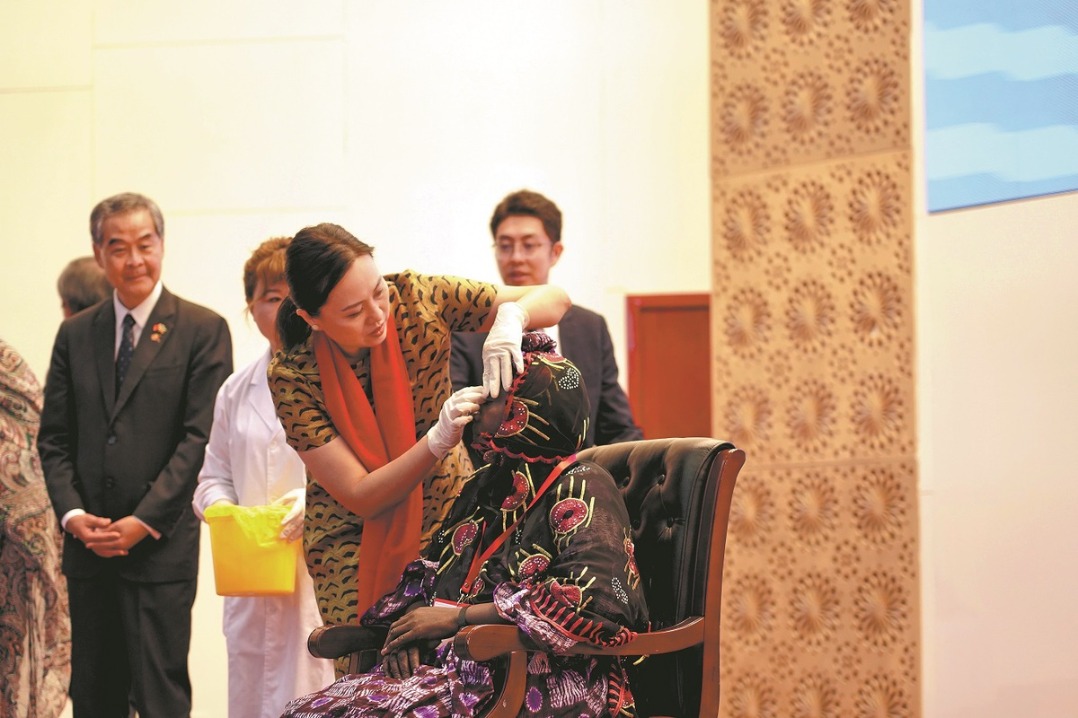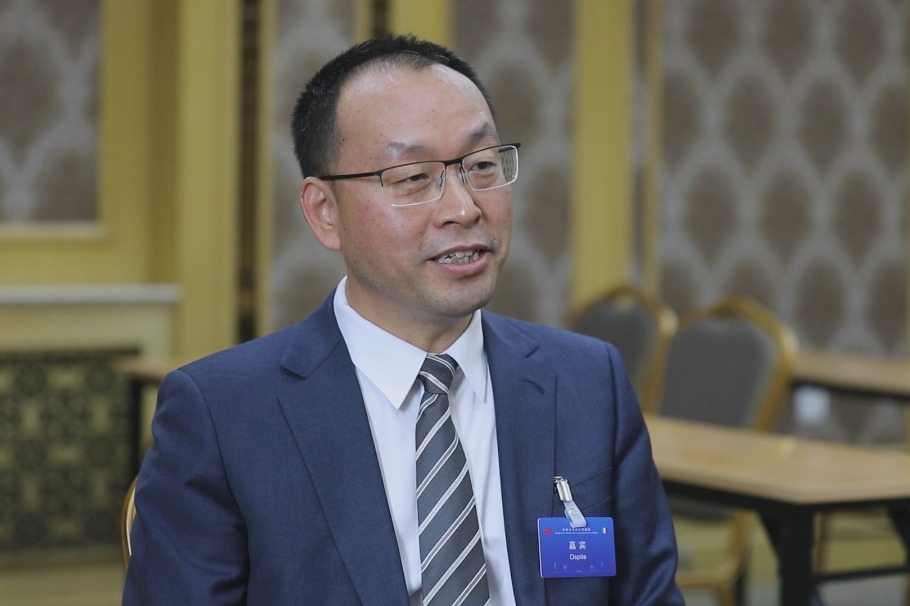President Xi and little ambassadors of Hungary-China friendship

by Xinhua writers Jiang Hanlu, Liu Chang
BUDAPEST/BEIJING -- Nestled near the glittering Danube River in the Hungarian capital of Budapest, a Hungarian-Chinese bilingual school has enjoyed rising popularity in recent years.
Saying "Nihao," hello in Chinese, is the first lesson for students. Many of them can fluently recite the Chinese version of poems by Hungarian poet Sandor Petofi. Teachers there also give lectures on Lu Xun, one of China's greatest modern writers in the 20th century.
Founded in 2004, the school has played a unique role in promoting cultural exchanges between China and Hungary over the past two decades. And in 2009, its bond with China grew stronger after a visit of a special guest.
"HELLO, UNCLE XI"
For Zsuzsanna Erdelyi, principal of the school, many heart-warming moments of the visit by Xi Jinping, who was Chinese vice president then, remain fresh in her memory.
During the tour of the school, he kept a smile on his face, and chatted with the children about poems and nursery rhymes, Erdelyi recalled.
To greet Xi, students wrote in Chinese characters on a blackboard "Hello, Uncle Xi." They also sang Mandarin songs, danced ballet and put on martial arts performances.
Xi was particularly impressed when two students recited "Quiet Night Thoughts" and "Love Seeds," two classic poems from China's Tang Dynasty more than 1,000 years ago.
Applauding the children's performance, Xi shared with them his appreciation of the Hungarian culture and the long-running bilateral cultural exchanges. He took himself as an example, saying that quite many Chinese of his age watched "Ludas Matyi," a 1950 Hungarian movie based on an eponymous poem.
Noting that some Chinese literature classics like "A Dream in Red Mansions" were translated into Hungarian long ago, Xi said that many Chinese were also fond of the Hungarian Rhapsodies, a collection of 19 piano pieces by Hungarian composer Franz Liszt, who is considered the greatest piano virtuoso of his time.
Xi gave textbooks and teaching equipment as gifts to the school. The students also returned a present to him: a piece of drawing of a little red heart with some handwritten warm wishes.
Over the years, the Chinese leader has followed the school's development, said Erdelyi. "He gave a lot of valuable advice for the school, including the famous Chinese proverb: 'It takes 10 years to grow trees, but 100 years to cultivate people.'"
"Teaching children is a similar process ... It's only when they turn into adults after many years of schooling that we truly appreciate the impact of school education on their lives," she added.
NEW YEAR'S GREETINGS
To commemorate Xi's visit 15 years ago, a group photo of Xi and the students still hangs on the wall in the school's hallway. That trip saw the start of a special bond between the Chinese president and the students and teachers of the school that spans the years.
Prior to the Spring Festival of 2023, Bonita Varga and Tamara Imre, two Hungarian students whose Chinese names are Hu Lingyue and Song Zhixiao, received scholarships for the second time from China. So they decided to write a letter to Xi and his wife, Professor Peng Liyuan, on behalf of all students in the school to express their gratitude and convey their Chinese New Year's greetings.
They tried to write on different kinds of paper to make sure that their letter looked nice. In their letter, they wrote about their experience of studying Chinese in the school for 12 years, and expressed their willingness to study at Chinese universities and contribute to the Hungary-China friendship.
Not long after they mailed the letter, Xi replied. Xi said he still remembered chatting with teachers and students of the school in 2009. He encouraged Hungarian youths to learn more about China and become envoys of the China-Hungary friendship.
Encouraging the students to study in Chinese universities after graduation from high school, Xi said he hopes that more and more Hungarian youths will love to study the Chinese language.
Erdelyi said Xi's reply "was a big surprise for us." With his encouragement, many students in the school are aiming to "play an important role in building the relations of the two countries," she said.
Now, over 7,000 km away from Budapest, Varga and Imre have realized their dreams of studying in China. Last autumn, the two students began their undergraduate studies at the Capital Normal University in Beijing.
Their life in Beijing has been quite interesting, and challenging as well. They encounter "cross-cultural experiences" almost daily. Take food: the Chinese people eat a lot of rice, while the Hungarians prefer potatoes and bread. But the pair have also found that both peoples love a homely dish -- "beef stew with potatoes."
"I am willing to be a warm-hearted envoy of China-Hungary friendship," said Varga, whose wish is to be a Chinese language teacher or a translator after graduation.
STRONGER CULTURAL TIES
Wang Yue, deputy principal and Chinese teacher at the school, said Xi's reply greatly inspired students. More of them now have a stronger enthusiasm to learn Chinese and to study in China.
Erneszt Sandor Durand, a 12th-grade student of the school, has been to many Chinese cities such as Guangzhou, Shenzhen and Beijing. As China's importance in the world economy is increasing, so is the importance of learning Chinese, he said, adding that he plans to further his studies at universities in Beijing in the future.
Dorina Inges, also a student of the school, said she is quite fascinated with the Chinese culture. She can play guzheng, a traditional Chinese musical instrument, and dance traditional Chinese folk dances.
The growing popularity of the Chinese language and culture among the Hungarians also contributes to the school's continuous development over the past two decades. Initially, most students were from Chinese families living and working in Hungary. Currently, the school has 12 grades and 20 classes with more than 530 students, with the majority being native Hungarians.
"The bilingual school far exceeds traditional economic, cooperative and other types of relations," former Hungarian Prime Minister Peter Medgyessy told Xinhua. "It actually encompasses the opportunity for interpersonal connections, the chance for people to get to know each other, to learn and recognize each other's culture and civilization, and to embrace these, encouraging people to be open, curious, and objective in such matters."
Guo Jiaming, former deputy principal of the school, told Xinhua that the school's development reflects the good momentum of strengthening China-Hungary relations and growing exchanges between the two peoples.
Presently, there are five Confucius Institutes in Hungary, and 12 universities in China offer opportunities to learn the Hungarian language.
The Chinese language has been incorporated into Hungary's national education system and has become one of the subjects in the university entrance examination. The cultural centers set up by both sides are also an important platform for cultural exchanges.
"It is important to the relations of the two countries to have people who speak both languages well," said Erdelyi, expressing her hope to see more intercultural exchanges to promote understanding and friendship between the two peoples.
- China's large neutrino observatory nears completion
- Chinese, Italian universities to usher in new era of architecture
- China achieves complete real-time reception of satellite data
- China's CAS Space launches 15 satellites, including Oman's first, in landmark commercial launch
- China, Italy urged to deepen educational cooperation
- Panda-themed railway station to open soon in Chengdu





































